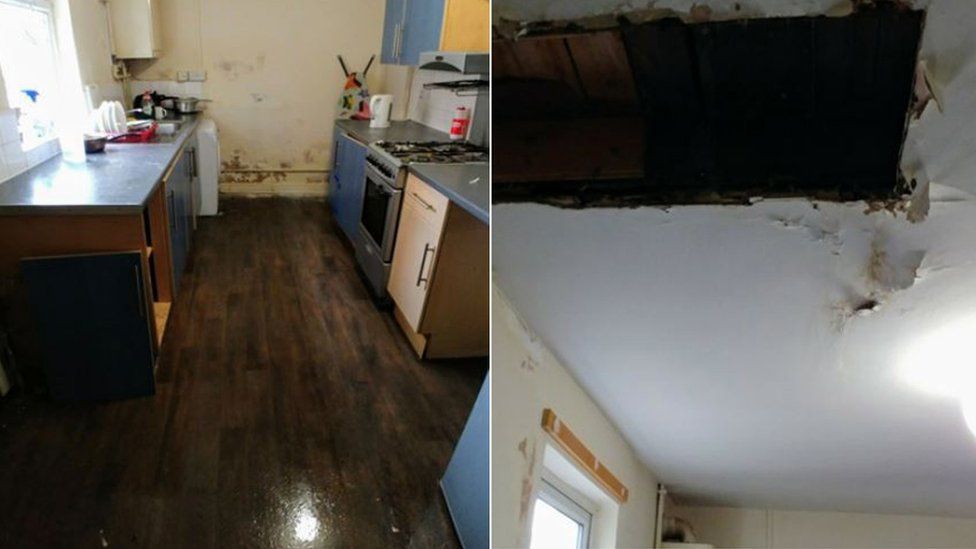Asylum seekers in 'damp, dirty, vermin-infested' housing
- Published

Less than a quarter of state-run accommodation for asylum seekers in the UK is compliant with standards, a much-delayed report has found.
The Chief Inspector of Borders and Immigration cited evidence of damp, dirty and vermin-infested properties.
Some of the accommodation was found to be unsuitable for vulnerable groups, including survivors of torture or domestic violence.
The Home Office said it was "committed to improving" the service.
Chief inspector David Bolt, who sent his report to ministers four months ago, also criticised the government for failing to have a "grip" on the number of pregnant asylum seekers or those who had just given birth.
What did the report look into?
Refugees seeking asylum in the UK are eligible for financial support or help with housing from the Home Office, if they can prove they are destitute.
Accommodation for asylum seekers is managed in six regions by three private providers operating under a Home Office contract.
Mr Bolt said the inspection "proved more challenging than most" because of "several reasons, not least the difficulty of extracting evidence from the Home Office."
"My report is likely to please no-one," he added. "It is clear from the Home Office's response to the draft report that this topic touches a nerve."
What did inspectors find?
According to the report, Home Office contract officers - whose job it is to check accommodation meets the requirement of the contract - inspected 8,313 properties in 22 months and declared 3,567 (43%) as "not fit for purpose" or needing "urgent" repairs.
Only 24% were found to be "compliant" with standards.
The chief inspector said much of the evidence focused on "poor property standards" with "frequent" references to defects, damp, dirt and vermin.
Examples included:
- The ventilation in one flat so bad that a three-year-old boy began suffering health problems
- "Blocked drains, an infestation of rodents, damp and mould" in a mother and baby unit for seven women with children under the age of two
- Young people with high levels of trauma being placed in houses shared with older men with alcohol and drug problems
- In some cases, asylum cases were told not to touch fixtures - meaning one new mother waited a month for someone to put together a cot, and others waited a fortnight for a light bulb to be changed.
Some of the housing was assessed as unsuitable for vulnerable groups, including survivors of torture and victims of domestic violence.
Mr Bolt also expressed concern about the way information on pregnant women and new mothers was recorded and shared.
He said: "An overall grip on the numbers and distribution of pregnant and post-partum women within the asylum accommodation system is not a 'nice to have', but is essential to a proper understanding of whether the present policies and practices are meeting the needs of this particularly vulnerable group."
The report concluded that the Home Office was "too accepting" of the limitations of the current contracts, which are due to be replaced or renewed in September 2019, saying there was "much more" that the department should do to bring about improvements.
"The system will always rely on collaboration, but it is the Home Office that holds most of the keys," said Mr Bolt.
What did the Home Office say?
The Home Office said: "Our comprehensive action plan will support customers in raising issues with their accommodation and ensure vulnerable people receive a more tailored service.
"In addition, we have restructured our routine inspections so that our approach to managing the contracts and accommodation standards is more consistent nationally."
What has the reaction been?
The head of advocacy at the Refugee Council, Andy Hewett, said the charity was "deeply concerned" by some of the report's findings, but said they were not new "by any stretch".
And Gary Christie, head of policy at the Scottish Refugee Council, said they have dealt with many issues around poor standards of housing for asylum seekers.
"One recent case involved a young mother and her daughter," he said. "Whilst her flat was overall in a satisfactory state, the close was filthy, ridden with litter, and urine-filled with a disgusting odour.
"It had a standing sofa that blocked entry to the backdoor, rubbish bins and safe exit in the event of a fire. There was race hate graffiti on a wall."
Earlier on Tuesday, the Home Affairs Select Committee heard from regional representatives across the UK as part of a new inquiry examining asylum accommodation contracts.
Greater Manchester mayor Andy Burnham told MPs the current arrangements were "not fair to the people arriving needing support, not fair to the host communities, not fair to the local authorities".
"The only people the current arrangements work for are the Home Office and the contract providers," he said.
- Published19 March 2018
- Published24 April 2018
- Published15 January 2018
- Published8 August 2018